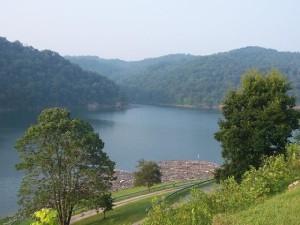We have much more to do and your continued support is needed now more than ever.
Coal Chemical Spill Fouls West Virginia’s Elk River

As the Associated Press reorts, authorities are rushing to supply affected citizens with bottled water:
The federal government joined the state early Friday in declaring a disaster, and the West Virginia National Guard planned to distribute bottled drinking water to emergency services agencies in the nine affected counties. About 100,000 water customers, or 300,000 people total, were affected, state officials said they reported in requesting the federal declaration.
Shortly after the Thursday spill from Freedom Industries hit the river and a nearby treatment plant, a licorice-like smell enveloped parts of the city, and Gov. Earl Ray Tomblin issued an order to customers of West Virginia American Water: Do not drink, bathe, cook or wash clothes with tap water.
The chemical, a foaming agent used in the coal preparation process, leaked from a tank at Freedom Industries and overran a containment area. Officials from Freedom, a manufacturer of chemicals for the mining, steel, and cement industries, hadn’t commented since the spill, but a woman who answered the phone at the company said it would issue a statement later Friday.
People can drink bottled water, but what about the Elk River’s fish, birds and wildlife, along with the sportsmen and outdoor businesses that depend on them? Doug Inkley, National Wildlife Federation senior scientist, tells me there’s some testing data on rabbits showing that, like with people, the chemical called 4-methylcyclohexane methanol is sickening but not deadly even in high concentrations. However, its effects on fish aren’t publicly known. We’re keeping in close contact with the West Virginia Rivers Coalition, our state affiliate, to monitor any potential impacts.
The extreme threats coal poses to West Virginia’s people and wildlife are exactly why the National Wildlife Federation last June joined a coalition asking the U.S. Office of Surface Mining Reclamation and Enforcement to investigate the West Virginia Department of Environmental Protection. Time after time, the agency has failed to perform proper oversight, has been lax in inspections, and has given out fines that are far too small to force companies to clean up their acts. On December 29, the agency said it would investigate five of our allegations.
“This spill shows coal is nasty business,” says Jim Murphy, the National Wildlife Federation’s senior counsel. “Areas like West Virginia that let their regulatory agencies become subsidiaries of the coal industry are paying the price by sacrificing their clean water.”
Coal doesn’t just put our fish, wildlife and communities at risk in Appalachia – as the National Wildlife Federation has reported, the coal industry also threatens the Pacific Northwest.
It’s time to break America’s dependence on dirty coal. Its production destroys mountains and pollutes our waterways. Its transport threatens our communities. And its burning pollutes our air & water and cooks our climate.
![]() Please take a moment to ask your members of Congress to extend key incentives for clean energy.
Please take a moment to ask your members of Congress to extend key incentives for clean energy.
UPDATE 12:40pm: Angie Rosser, Executive Director of the West Virginia Rivers Coalition, just issued this statement:
We are seeing today how dependent we are on clean rivers for our health and security. The immediate priority is for public health officials to determine the extent of the problem and to ensure the safety of public water supplies. Then, we must take a critical look at how to better protect our vital drinking water sources.
The chemical industry is a part of our current economy in West Virginia, and with that, we live with the potential for human error, equipment failure or malfunction, and resulting leaks that can have devastating consequences. We think it is an unnecessary risk to allow hazardous chemicals to be produced or stored immediately upstream of the water supply for some 300,000 West Virginians. It also seems apparent that the involved chemical company placed the public at risk by not immediately reporting the spill to proper agencies and authorities.
Clean water is essential for life. We cannot cut corners in ensuring that our drinking water supply is protected. There is too much at stake – our health, our economic stability, our confidence in water security. We hope that once the immediate crisis phase is over, serious thought will go into meaningful reforms and investment in protecting our rivers and streams that are our lifeline.






















